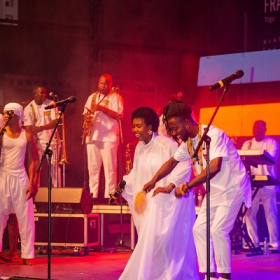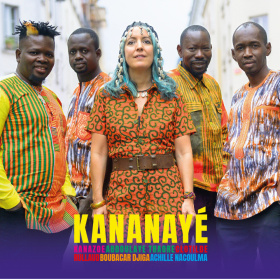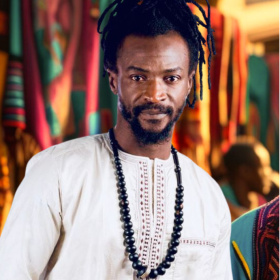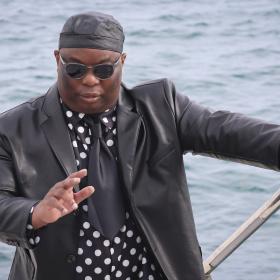Ali Kaifa: the man who built Ethiopia’s Motown
Great music is usually presumed to belong to the imagination of the singer. Hardly do producers, who play an important role in bringing the songs to life, receive much attention. The contribution by Ali Abdela Kaifa (popularly known as Ali Tango) to the modern Ethiopian music recording industry cannot be ignored.
 Record label producer Ali Tango. Photo: www.ethioobserver.com
Record label producer Ali Tango. Photo: www.ethioobserver.com
His work has attracted attention the world over, including that of French music expert Francis Falceto. Falceto included many of Ali’s records on the compilation series of Ethiopiques. Many of Falceto’s compilations also owe their sound and character to the highly influential work of Ali Tango behind the scenes.
A pillar of the Addis Ababa music scene in the 1970s to the 90’s, Ali’s prodigious output was the result of his skill at organization and self-discipline. His label, Kaifa became a successful independent record label in Ethiopia, producing some of the great, most uplifting and most enduring popular music in history. Ali, was born in Jimma, South West of Addis Ababa, to an Ethiopian mother and Yemeni father. He started out assisting his father in the coffee trade in his teen years while still attending school. Ali also played football and encouraged his younger brother Ahmed Muker to play the game. Ali’s father taught his children the value of family and hard work. When the coffee trade declined, Tango in an effort to carve out a livelihood, became an agent for Sony, distributing radio and television sets.
After listening to the captivating sound of Getachew Kassa’s song 'Tizita', Ali was hooked to the sound of local music. He decided to venture into the world of music business, eventually transforming Calypso Music shop -that his mother bought- into Tango Music shop in the early 1970s. The shop later became his professional address for more than three decades.
“Coincidentally, my shop was located in the center of Piazza in front of Amha’s Harrambee shop and I used to sell many of Amha’s records, which gave me insight into the potential of the music business,” Ali recalls. He says the business further deepened his desire to record and produce music albums in reel. At the time, the music recording industry was dominated by Amha Eshete and Phillips Ethiopia.
With Getachew’s songs already having left a mark on him, Ali always had Getachew in mind when setting up the business. Unfortunately for him, Getachew had secured a deal with Amha’s Harambe Music and Ali had to find other artists to work with. After securing legal license and recording for others, Ali would later launch his label Kaifa Records which later on become an integral force in the development of the modern music recording.
Outstanding Kaifa artists
One of the first artists he recorded on vinyl was Alemayehu Borobor whom he had watched perform on TV. At the time Alemayehu was a backing vocalist with the Ibex Band. Though the first recording with the artist wasn’t an instant hit it achieved some level of success. “The first release had modest reception, not as much as I expected,” Ali says. Nevertheless, the two continued collaborating and Ali worked with other prominent musicians such as Ayalew Mesfin, Alemayehu Eshete, Bizunesh Bekele, Tamrat Ferenji, Muluken Melesse and Atselefetch Ashene. Some of these records were reissued with an altered track listing as Ethiopiques 13, Ethiopian Grooves, the Golden Seventies in 2002.
After the 1974 revolution, the pioneering Amha Records was closed and its owner, Amha Eshete relocated to the US. The demand for fresh recordings was high hence Kaifa records thrived on to fulfill the demand to accompany the clandestine lock-in parties that replaced the night scenes of the years gone by. From 1978 onwards, Kaifa switched its attention from vinyl to the cheaper medium of cassettes, a technology that made a massive impact on music distribution in the country. Ali understood the accelerating importance of popular culture and felt that he was in the right place at the right time to take up the torch for the music recording. Ali went on to record and produce consequently launching the careers of a number of artists including Ali Birra, Neway Debebe, Hamalmal Abate, Kiros Alemayehu and Sofia Atsebeha.
Aster Aweke is also among the successful artists whose career was launched by Kaifa records. “The idea of finding women to back up the Walias band whose record I was producing in 1974 occurred to the band members. They asked around and they brought three girls with them. One of those girls was Aster Aweke,” Ali recalls. Seeing the potential in her, Ali asked Aster Aweke to work with him. At the time Aster Aweke was temporarily working for the Hager Fikir Theatre. She welcomed the idea and Ali recorded her songs on vinyl. Listeners, however, often commented that Aster’s voice wasn’t clear.
To counter this Ali proposed that Aster teams up with the late Woubishet Fisseha. Both Aster and Woubishet rehearsed together for a year before they got to record together. The recordings this time round were satisfactory. Because he believed in her, Ali did a lot to promote her work through radio and TV commercials besides advising her on other aspects of performance. Both Aster’s and Woubishet’s albums were printed in 1975. Ali continued working with Aster and together they released four more albums and two singles. Her success on the home front propelled Aster to newer markets. With this success she (Aster) found herself in great demand, being asked to sing at parties and at clubs.
She eventually immigrated to the United States in 1982, first settling in California and then in Washington, D.C. She became the first Ethiopian whose recordings were distributed internationally by a major record label, with her album released by Iain Scott at Triple Earth Records in UK in 1989.
Another musician who generated excitement almost immediately while recording with Kaifa Records was Oromo singer Ali Birra. Ali Birra, joined the Imperial Body Guard Band in 1966 and first recorded with Kaifa Records in 1977. The recordings made him one of the best known artists, kick-starting his long and prolific career.
“When I first met Ali Birra, his fame was restricted to his native town of Dire Dawa. Initially I was not willing to take a chance by recording him. But he insisted that I record him and I gave in. To my surprise, he became an instant hit in Addis Ababa and elsewhere in the country.”
Hailu Mergia and Neway Debebe are some of the other artists Ali worked with. While Hailu went on to settle in the US where he played with the Walias band, Neway attained a level of success working with Ali’s Kaifa records. A relatively newcomer on the Ethiopian music scene, Neway had been turned down by various for his voice which they said was more suitable for revolutionary songs.
Ali recounts that Neway’s debut album—which he recorded—instantly brought the artist some attention. “Singles such as ‘Eshete Belahu’ and ‘Ye Tikimt Abeba’ brought him the recognition that I could hardly imagine,” Ali says. Within a month, the sales reached greater than 100,000 copies, which was a far cry from the vinyl copies that sold around 3,000 copies.
Now aged 57 Neway Debebe, recently returned to Addis Ababa after years of stay in the US. The artist recounts his venture into music: “I was going around asking music labels, showing my compositions. Finally Ali was the only one willing to record me.” He says that he is forever indebted to Tango music shop, its owner Ali Kaifa and studio engineer Mensur Abdurahaman for inducting him into the world of music and making his music accessible to the wider public. “I have tremendous respect for people like Ali who not only love music, but put their money where their mouth was.”
Over the years Ali Kaifa produced a significant body of cassettes, releasing 53 records between 1973 and 1977. He helped many young artist’s transition from amateur performers to best-selling recording artist. As a businessman, Ali earned a reputation for being honest and generous with musicians when it came to earnings.
Low quality production
With semi-professional studios to no-professional studios, Ali acknowledges that the productions of the past years was quite poor. The then government’s failure to grant them licenses to import better equipment also did not help matters. Equally worrying for Ali at the time was the problem of piracy, which he found appalling and made the industry precarious. As more and more shops opened Ali says, the problem got bigger: “When I released a new cassette, other outfits made unauthorized copies of the cassettes and sold them in their shops, very little ended up in the pockets of the recording artists and record label.”
The piracy at the time was so serious that for four years Ali was forced out of the recording business. Ali’s dexterity extended into the new concept of music video business. Falceto, who was in Addis Ababa in those days, remembers that, “People were queuing every day at his shop, renting videos (mostly films or TV programs from American and English TVs), as they were fed up with the socialist propaganda on the state-run television and radio.”
Ali is warm in his praise for Falceto, who later reissued some of his works and made them available in the international market. Ali also gives credit to the former Roha Band, which he says were among his long-time associates. His label, Tango, closed shop. The last cassette he recorded was in 1990, featuring Getachew Gadissisa’s ‘Yifeal buna, yifela sahi’, which was a hit that year. After Ali’s departure, first to Yemen and then the US, his son Adil tried to keep the flame by running the music shop in the Atikilt Tera area. He managed to do that for about five years, finally giving it up five years ago.
At 74 years Ali Tango, leads a quiet life in Seattle, Washington. He has lived there for the past eight years.
The article was based on skype interview with Ali Kaifa and email communication with Francis Falceto. Originally published in The Ethiopian Observer on 13 September 2016





















Commentaires
s'identifier or register to post comments